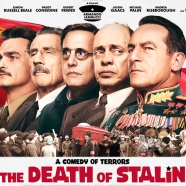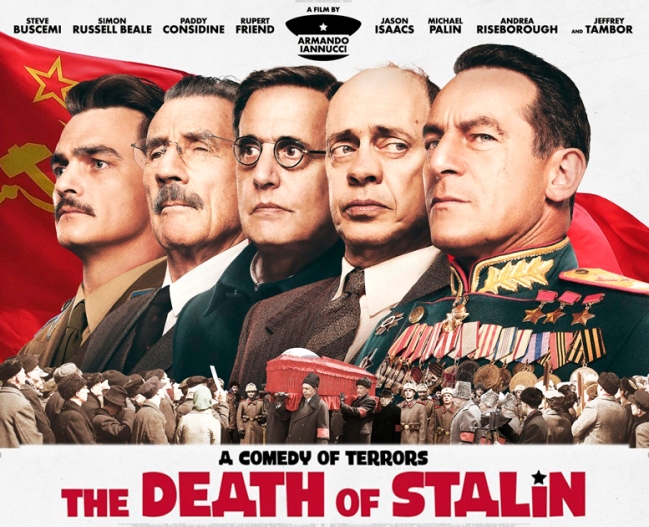 March
27
March
27
Tags
The Death of Stalin (2017)

Political satires are a devious genre for many reasons. They use black comedy to mock their subject but are not always clear about who or what that subject may be. The devilishly dark British-American-French film The Death of Stalin (2017) is ostensibly about the 1953 demise of one of the world’s cruellest despots, Joseph Stalin. But when you look closely, you find unmistakable parallels with despots elsewhere
The film quickly shows a Stalinist Russia that is ruled by fear, where no Moscow apparatchik can be sure of living to the end of any day. Having jailed or killed the nation’s best doctors, Stalin’s stroke is pure karma. His bodyguards outside hear the mighty ruler crash to the floor but were commanded not to interrupt him under any circumstance. As he lay in a puddle of his own urine for several hours, his Central Committee henchmen enter the office one by one to profess their devotion but do nothing. As the tyrants-in-waiting Beria, Malenkov, Khrushchev, Zhukov, and Molotov join the gathering, it is clear that nobody wants Stalin to survive but all are terrified he might live to take it out on them.
As Stalin fades away, the jockeying for succession between the aspiring leaders escalates. Nobody trusts anybody, and everybody conspires to eliminate the others. Meanwhile, the population begins compulsory mourning and civil unrest is quelled with mass shootings. By the time of Stalin’s funeral, Committee members have plotted and double-crossed each other so many times that nobody knows who will survive. Fake news and information leaks by conspirators are used to frame multiple assassination plots until Khrushchev is the last man standing. As he assumes the role of Russia’s Supreme Leader, he is watched from the wings by the up and coming Brezhnev who will soon take his place.
All of this sounds like well-documented Russian history, so how is it a comedy? There is a delicious irony in the meticulously constructed and authentic-looking mid-1950s palatial Russian settings and the cast of actors with outrageously exaggerated British, Irish, Scottish and Welsh accents. The intelligently funny one-liners are delivered with forensic timing to portray Russian politics as stranger than fiction. It is no wonder that the film is banned in modern Russia; the callous disregard for human life and the incoherently ridiculous maneuvering for the top job speaks volumes for the way Russia’s political process operates. If this is not enough to crack you up, a more sombre insight is that the petty posturing and chaotic decision-making looks contemporary.
Students of Russian history may wince at the disrespect shown for an historical era in which so much carnage can be traced directly to Stalin or the suggestion that the Stalin-Khrushchev-Brezhnev triumvirate has transitioned to the Putin era. But this is not a film for serious political discourse; rather it is a lampooning of the political culture existing in many nations that, some may say, has echoes in today’s America.

Director: Armando Iannucci
Stars: Steve Buscemi, Simon Russell Beale, Michael Pallin, Adrian McLoughlin

Great review. I went to see this film having next to no knowledge of Soviet history. After seeing it, I read about the events depicted and was surprised (and disturbed) to learn how much was accurate.
LikeLiked by 2 people
This is indeed an example of life being stranger than art. But when you look at Washington today nothing seems too weird. Thanks for commenting Berthold.
LikeLiked by 1 person
Couldn’t agree more with your point about Washington. The satirist Tom Lehrer once said that satire became obsolete when Kissinger won the Nobel Peace Prize. I wonder what that makes it in the present day?
LikeLiked by 1 person
LOL. Good point.
LikeLiked by 1 person
I am having trouble with my review for the opposite reason.
LikeLike
Can you expand on that comment please? I’m intrigued.
LikeLike
As someone who saw Brezhnev in Minsk in the late 70s I am going to have a special interest in this film – spoof or no 🙂
LikeLiked by 1 person
We baby boomers remember these Russian goons all too well.
LikeLiked by 1 person
I enjoyed this movie much more than I expected to. The acting and writing are so good and it all feels like it’s an original interpretation of historical events. I also enjoyed reading your review, which reminded me of why I liked this film.
LikeLiked by 1 person
It was only minutes into the film when I realised this was also a satire on political leadership in broader contexts. It’s very clever. Insightful, and funny.
LikeLike
Very funny and awfully dark. Nice review.
LikeLiked by 1 person
Thanks Dan O.
LikeLike
Mine looks to be the lone voice of dissent on this thread (unless the ambiguous comment by ‘anonymous’ was of a mind). I watched the film yesterday and was buoyed by the many positive reviews I’d read beforehand.
Unfortunately, your experience was not my own, though perhaps you came into it fresh, CineMuse? Most of the funniest lines had already been seen by me in the shorts so had lost their punch. Apart from that, I thought the film played endlessly on the one joke and I became bored.
I wonder at the result had they not played it for laughs? Good cast. Lavish production! Who knows?
LikeLiked by 2 people
Interesting comment that does not necessarily imply dissent. It reminds me that comedy can be read at several different levels. On a line by line basis the film has no claim on original material. Even on a skit by skit or a scene by scene count it is relatively tame. But it is on the situational or contextual level that the film excels. The depiction of national leadership succession as akin to a barnyard squabble and the use of culturally incongruous accents is both original and funny. Don’t you think?
LikeLiked by 1 person
Hi again. You’ve issued a challenge for me to think more on this. (Thought I’d got away easily!;-))
As it stands, I got the joke(s). They were walking on eggshells lest they inadvertently put themselves in the firing line. That seemed to be the wellspring of humour though it was played out in various iterations. Despite the permutations and combinations I still saw it as the one joke and tired of it in time.
Unfortunately I’d watched the trailer on many occasions so I was thoroughly attuned to its style and missed the surprise element. Maybe I’m becoming jaded? Comedy is such a tricky genre to pull off.
I liked the culturally incongruous accents. A witty addition to my thinking.
Still love your blog, despite not agreeing on this occasion.
LikeLike
That was me, Nitya (aka Anita) by the way. I’m on my computer.
LikeLiked by 1 person
What part of the globe are you in Anita?
LikeLike
I’m in a suburb on the south eastern outskirts of Sydney. My usual venue is Dendy Newtown, though I must pass many cinemas on the way.
LikeLike
That’s one of my favourites too, along with Palace Norton and my nearest, the Orpheum.
LikeLike
Yes, I recall reading that the Orpheum was a favourite haunt of your’s. To think we may well sit through a screening at Newtown or Norton Street, each processing the film according to our own preferences and life experiences?
I have a couple of friends who regularly attend The Orpheum but it is a little out of my way. I’ve been a few times and love the Art Deco ambience, but finding parking is the big detractor.
LikeLike
Small world. “Love, Simon” next at the Orpheum.
LikeLike
It looks like an interesting film and I think my film-friend would highly approve. I look forward to reading your next review.
At the moment, I’ve been enticed into watching Netflix series “Babylon Berlin”. Do you review series? This is very promising so far. (Just one episode in, I’m afraid).
LikeLiked by 1 person
No, there is so much to follow that I must filter my watchings. Next trimester I’ll be looking at TV crime-genres so expect more reviews in this area.
LikeLiked by 1 person
Film conversation would be incredibly dull if everyone agreed all the time. Your contributions always brighten my day Anita.
LikeLiked by 2 people
Pingback: Favourites 2018 | CineMuseFilms